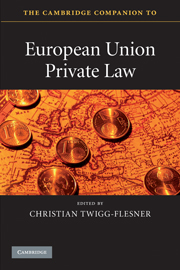Book contents
- Frontmatter
- Contents
- Preface
- List of Contributors
- Table of cases
- Table of legislation
- 1 Introduction
- 2 The historical evolution of European private law
- 3 European private law and the comparative method
- 4 The role of the conflict of laws in European private law
- 5 Competence and European private law
- 6 Language and terminology
- 7 European private law by directives
- 8 The European Court of Justice as a motor of private law
- 9 European contract law
- 10 The way forward in European consumer contract law
- 11 Commercial contracts and European private law
- 12 European tort law
- 13 European Union property law
- 14 Information obligations and withdrawal rights
- 15 Travel law
- 16 Unfair contract terms
- 17 Unfair commercial practices and European private law
- 18 Consumer sales and associated guarantees
- 19 Product liability
- 20 Commercial agency in European Union private law
- 21 EU competition law and European private law
- 22 Non-discrimination and European private law
- 23 Financial services in European Union private law
- Further reading
- Index
6 - Language and terminology
Published online by Cambridge University Press: 05 July 2015
- Frontmatter
- Contents
- Preface
- List of Contributors
- Table of cases
- Table of legislation
- 1 Introduction
- 2 The historical evolution of European private law
- 3 European private law and the comparative method
- 4 The role of the conflict of laws in European private law
- 5 Competence and European private law
- 6 Language and terminology
- 7 European private law by directives
- 8 The European Court of Justice as a motor of private law
- 9 European contract law
- 10 The way forward in European consumer contract law
- 11 Commercial contracts and European private law
- 12 European tort law
- 13 European Union property law
- 14 Information obligations and withdrawal rights
- 15 Travel law
- 16 Unfair contract terms
- 17 Unfair commercial practices and European private law
- 18 Consumer sales and associated guarantees
- 19 Product liability
- 20 Commercial agency in European Union private law
- 21 EU competition law and European private law
- 22 Non-discrimination and European private law
- 23 Financial services in European Union private law
- Further reading
- Index
Summary
European private law and European legal language(s)
Whenever a new political entity with legislative powers is set up, this entity will need some linguistic means for formulating its norms. The European Community and its predecessors are no exception in this respect. Making European private law raises a number of problems concerning the language(s) in which European law must be expressed, its terminology and the style of legislative drafting to be adopted. And, as all norms are put into practice when they are applied to a given case, the interpretation and construction of European law are part and parcel of the same set of problems. This chapter provides a short survey and critical discussion of how these problems have been addressed for European private law as developed in the context of the European Community. Within that context, one could argue, on the one hand, that the continental European divide between public and private law is not entirely suited to capturing the spirit and the reality of European law, as the regulatory competence of the EU transcends that classical distinction in many ways. On the other hand, the issue of language and terminology in European private law requires some treatment simply because in the recent decades EU law has regulated subjects that in many European countries form part of ‘private law’, such as the laws on natural and legal persons, contracts, torts, property, family and succession. As a consequence, these areas of law can no longer be considered as belonging exclusively to the law of the Member States. They have gained a European dimension. What makes this so interesting and challenging in the present context is the fact that the particularly rich and, in many ways, unique sets of terminology that the legal systems of Member States have developed for private law had little equivalence in the terminological acquis communautaire at the time when the EU embarked on a large-scale regulation of issues belonging to private law.
- Type
- Chapter
- Information
- The Cambridge Companion to European Union Private Law , pp. 70 - 84Publisher: Cambridge University PressPrint publication year: 2010
- 2
- Cited by



